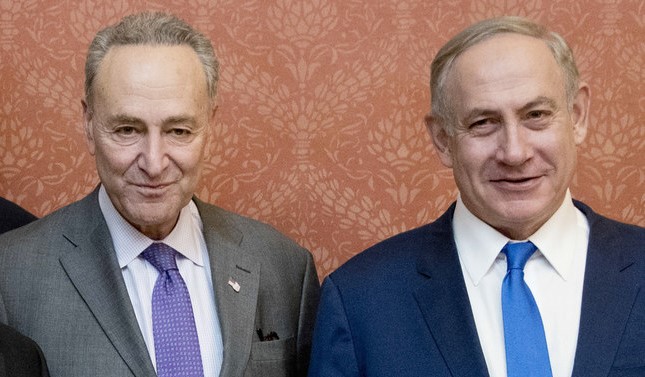TEL AVIV: Israeli Prime Minister Benjamin Netanyahu railed Sunday against growing criticism from top ally the United States against his leadership amid the devastating war with Hamas, describing calls for a new election as “wholly inappropriate.”
In recent days, US Senate Majority Leader Chuck Schumer, the highest-ranking Jewish official in the country and a strong Israel supporter, called on Israel to hold a new election, saying Netanyahu had “lost his way.” President Joe Biden expressed support for Schumer’s “good speech,” and earlier accused Netanyahu of hurting Israel because of the huge civilian death toll in Gaza.
Netanyahu told Fox News that Israel never would have called for a new US election after the Sept. 11 attacks in 2001, and denounced Schumer’s comments as inappropriate.
“We’re not a banana republic,” he said. “The people of Israel will choose when they will have elections, and who they’ll elect, and it’s not something that will be foisted on us.”
When asked by CNN whether he would commit to a new election after the war ends, Netanyahu said that “I think that’s something for the Israeli public to decide.”
The US, which has provided key military and diplomatic support to Israel, also has expressed concerns about a planned Israeli assault on the southern Gaza city of Rafah, where about 1.4 million displaced Palestinians are sheltering. The spokesman for the National Security Council, John Kirby, told Fox the US still hasn’t seen an Israeli plan for Rafah.
The US supports a new round of talks aimed at securing a ceasefire in exchange for the return of Israeli hostages taken in Hamas’ Oct. 7 attack.
The Israeli delegation to those talks was expected to leave for Qatar after Sunday evening meetings of the Security Cabinet and War Cabinet, which will give directions for negotiations.
Despite the talks, Netanyahu made it clear he would not back down from the fighting that has killed more than 31,000 Palestinians, according to local health officials. More than five months have passed since Hamas’ attack on southern Israel killed 1,200 people and left another 250 hostage.
Earlier Sunday, Netanyahu said that calls for an election now — which polls show he would lose badly — would force Israel to stop fighting and paralyze the country for six months.
Netanyahu also reiterated his determination to attack Hamas in Rafah and said that his government approved military plans for such an operation.
“We will operate in Rafah. This will take several weeks, and it will happen,” he said. The operation is supposed to include the evacuation of hundreds of thousands of civilians, but it is not clear how Israel will do that.
Egyptian President Abdel Fattah El-Sisi reiterated his warning that an Israeli ground offensive in Rafah would have “grave repercussions on the whole region.” Egypt says pushing Palestinians into the Sinai Peninsula would jeopardize its peace treaty with Israel, a cornerstone of regional stability.
“We are also very concerned about the risks a full-scale offensive in Rafah would have on the vulnerable civilian population. This needs to be avoided at all costs,” European Commission President Ursula von der Leyen said after meeting with El-Sisi.
And German Chancellor Olaf Scholz, after meeting with Netanyahu on Sunday, warned that “the more desperate the situation of people in Gaza becomes, the more this begs the question: No matter how important the goal, can it justify such terribly high costs, or are there other ways to achieve your goal?”
Germany is one of Israel’s closest allies in Europe and, given memories of the Holocaust, often treads carefully when criticizing Israel.
Alon Pinkas, a former Israeli consul-general in New York and an outspoken critic of Netanyahu, said that the prime minister’s comments fit with his efforts to find someone else to blame if Israel doesn’t achieve its goal of destroying Hamas.
“He’s looking on purpose for a conflict with the US so that he can blame Biden,” Pinkas said.
Both sides have something to gain politically from the dispute. The Biden administration is under increasing pressure from progressive Democrats and some Arab-American supporters to restrain Israel’s war against Hamas. Netanyahu, meanwhile, wants to show his nationalist base that he can withstand global pressure, even from Israel’s closest ally.
But pressure also comes from home, with thousands protesting again in Tel Aviv on Saturday night against Netanyahu’s government and calling for a new election and a deal for the release of hostages. Large parts of the Israeli public want a deal, fearing that hostages are held in poor conditions and time is running out to bring them home alive.
14


